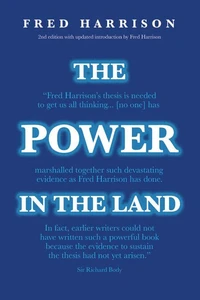Having correctly forecast the timing of the global crisis, the author now extends that same analysis to the future of the West, to evaluate fears from distinguished commentators who claim that European civilisation is in danger of being eclipsed. He concludes that the West is at a dangerous tipping point and provides empirical and theoretical evidence to warrant such an alarming conclusion. But he also explains why it is not too late to prevent the looming social catastrophe.
Attributing the present crisis to a social process of cheating, he develops a synthesis of the social and natural sciences to show how the market system can be reformed.
He introduces the concept of organic finance, which prescribes reforms capable of delivering both sustainable growth, with a more equitable distribution of wealth, and respect for other life forms.
To explain the persistent failure to resolve protracted social and environmental crises, the author introduces a theory of social trauma. Populations have been destabilised by the coercive loss of land to the point where they have lost their traditional reference points.
No longer able to live by the laws of nature, they are forced to conform to laws that consolidate the privileges of those who had cheated them of their birthright: access to nature's resources. Many pathological consequences flow from this tearing of people from their social and ecological habitats. To recover from this state of trauma, the author argues, people need to use the new tools of communication, such as social media, to regain control over their future destiny through a kind of collective psychosocial therapy.
The author challenges the view that the West can climb out of depression by applying the financial measures known as "austerity".
He outlines a new strategy that would restore full employment and reverse the decline in middle class living standards in Europe and North America.
Having correctly forecast the timing of the global crisis, the author now extends that same analysis to the future of the West, to evaluate fears from distinguished commentators who claim that European civilisation is in danger of being eclipsed. He concludes that the West is at a dangerous tipping point and provides empirical and theoretical evidence to warrant such an alarming conclusion. But he also explains why it is not too late to prevent the looming social catastrophe.
Attributing the present crisis to a social process of cheating, he develops a synthesis of the social and natural sciences to show how the market system can be reformed.
He introduces the concept of organic finance, which prescribes reforms capable of delivering both sustainable growth, with a more equitable distribution of wealth, and respect for other life forms.
To explain the persistent failure to resolve protracted social and environmental crises, the author introduces a theory of social trauma. Populations have been destabilised by the coercive loss of land to the point where they have lost their traditional reference points.
No longer able to live by the laws of nature, they are forced to conform to laws that consolidate the privileges of those who had cheated them of their birthright: access to nature's resources. Many pathological consequences flow from this tearing of people from their social and ecological habitats. To recover from this state of trauma, the author argues, people need to use the new tools of communication, such as social media, to regain control over their future destiny through a kind of collective psychosocial therapy.
The author challenges the view that the West can climb out of depression by applying the financial measures known as "austerity".
He outlines a new strategy that would restore full employment and reverse the decline in middle class living standards in Europe and North America.

 , qui est-ce ?
, qui est-ce ?